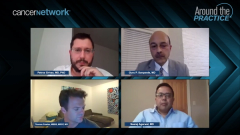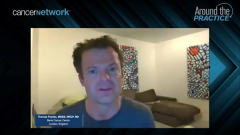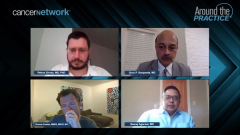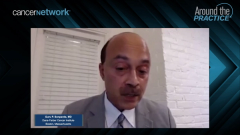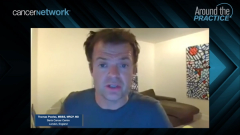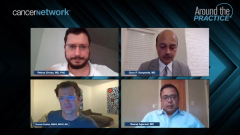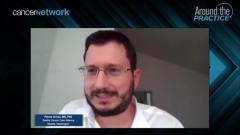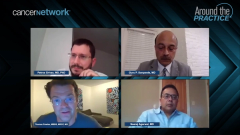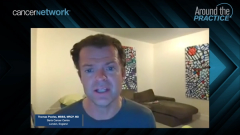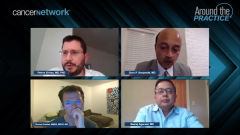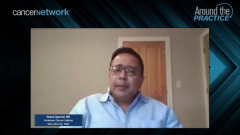
Patient Case: 78-Year-Old Man With mUC
Petros Grivas, MD, PhD, presents the case of a 78-year-old man with PD-L1+ metastatic urothelial carcinoma, and the panelists share insight on their treatment approach for the given patient.
Episodes in this series

Petros Grivas, MD, PhD: Let’s go to the case that we want the audience to comment on. This is a 78-year-old man with an ECOG PS1 [Performance Status 1]. His creatinine clearance is 50 mL/min, and he has grade 2 peripheral neuropathy. He’s showing borderline kidney function and grade 2 peripheral neuropathy. You can argue that this patient may not be a great candidate for cisplatin if he has a grade 2 neuropathy with kidney function that’s borderline, but the neuropathy is the problem shown here. Hospital on positive tumor based on this particular assay. It’s important to discuss quickly. Neeraj, how would we treat this patient with grade 2 neuropathy clearance near 60 cc/min otherwise 50 equal PH1?
Neeraj Agarwal, MD: Before I forget, I want to congratulate you—Tom as first author, and you senior author—on the JAVELIN Bladder 100 trial paper and the trial that has changed the treatment paradigm for all of us. I didn’t want to forget about that.
Thomas Powles, MBBS, MRCP, MD: Thank you. It was a huge team of people.
Neeraj Agarwal, MD: I should have said “and colleagues”—all the clinical trial investigators across the planet. This was a large trial, and it obviously required a village to do that. Coming back to this case, this is a creatinine clearance of 50 mL/min. Guru has published data on splitting of cisplatin between the creatinine clearance of 50 and 60 mL/min. But based on peripheral neuropathy, I would be less inclined to do that. In this case, as you just said, not only kidney function is impaired. The patient also has neuropathy. That basically brings this patient in the realm of cisplatin ineligibility. It makes it more clear to me. I’d definitely offer carboplatin rather than an immune checkpoint inhibitor alone. That would be my decision-making.
Petros Grivas, MD, PhD: Thank you, Neeraj. That’s very helpful. Guru, any comments? Do you agree with Neeraj?
Guru P. Sonpavde, MD: In general, I agree with the JAVELIN Bladder 100 paradigm. Carboplatin-gemcitabine has been 4 to 6 cycles followed by switch maintenance. Avelumab is reasonable, but we should remember that so is pembrolizumab. The higher level of evidence would favor the JAVELIN Bladder 100 paradigm because it’s a phase 3 trial. Having said that, first-line pembrolizumab—or of course atezolizumab—is reasonable in this patient. With a PD-L1–high cisplatin-ineligible patient, it’s reasonable. But remember, those data are based on phase 2 nonrandomized data sets.
Petros Grivas, MD, PhD: Thank you, Guru. PD-L1 high. For cisplatin patients, you’ve outlined the options nicely. Pembrolizumab or a digital line or the JAVELIN Bladder 100 approach. This particular patient went ahead and started with carboplatin-gemcitabine. The question I have for the audience here is: If the patient had a resistance to carboplatin-gemcitabine, if you were to use maintenance therapy, which agent would you use? Avelumab, pembrolizumab, nivolumab, atezolizumab. As our colleagues vote, Tom, you mentioned before that based on the substance analysis, the benefit was avelumab across the board—different subsets of patients across a response of stable disease or whatever regimen the patient received, gemcitabine or gemcitabine-carboplatin. Also, regardless of the treatment-free interval between the end of chemotherapy and initiation of avelumab based on recent data from ASCO [American Society of Clinical Oncology Annual Meeting] 2021. Tom, do you have a preference on whether you start availability sooner rather than later, after the end of chemotherapy, to avoid entering progression?
Thomas Powles, MBBS, MRCP, MD: That switch is important, and it comes back to the issue of how many cycles of chemotherapy is the right number. Some patients fly through chemotherapy and do extremely well, without too many adverse effects—grade 1 here, grade 2 there. Starting 4 to 6 weeks after you’ve done a CT scan, a couple of weeks after the last dose of chemotherapy, you see them in clinic for the results of that scan, give the information, and switch immediately across; that’s reasonable. But not everyone has that easy journey. Many patients by the time they get to cycle 4, 5, or 6 are beginning to struggle a little.
Then there comes a question about how hard you want to push that chemotherapy. How much do you want to push the toxicity, whether you want to dose reduce, whether you want to give all 6 cycles. If you want to give those 6 cycles, do you want to give patients a 6-week window? The adverse-event profile of immune checkpoint inhibitors in chemotherapy is very different. They’re not synergistic toxicities. When you give the immune checkpoint inhibitors, it’s unlikely that the neuropathy or the neutropenia or the other adverse effects will get worse, they’ll probably resolve. I wouldn’t necessarily say you have to wait until all the toxicities are resolved because you won’t make those adverse-event profiles worse for many patients. If they’ve had a rough journey with chemotherapy, and they want a few weeks off, then I understand that.
My preference is to start sooner rather than later. For obvious reasons, there’s no point in hanging around. Under those circumstances, 4 weeks is the perfect time to start. But if you said to me that the patient wants 6 weeks or wants to go on holiday after the chemotherapy, that seems reasonable. One thing we know is that the adverse-event profile of avelumab and the other immune checkpoint inhibitors and the quality-of-life data suggest that things will be relatively stable on that drug. Therefore, it’s reasonable to say things are going get better for the patients. Not for everyone. We all know the 10% of patients come into harm’s way…but not for everyone. But on the whole, it’s reasonable to say to patients that the second part of the journey is probably easier than the first part.
Petros Grivas, MD, PhD: Thank you, Tom. I have the same approach as you. The data show benefits across the board in terms of treatment for interval, but I discuss with the patient that I prefer sooner to avoid during progression, which can happen. Great discussion. Thank you for your comments.
The respondents’ answer to the question here is 92% of the audience selected avelumab as maintenance therapy and 8% pembrolizumab, so the vast majority switch to maintenance avelumab. To make sure that we finish on time, the next polling question is: “Which of the following factors do you weigh most heavily when choosing an immunotherapy in the first-line maintenance setting after carboplatin-based chemotherapy, where in advance you’ll see cancer? Antigen level of evidence, personal experience and comfort, indication in a product label, literature review, or formulary orpathways?” The audience can comment on these factors. Guru, any comments on your practice? When you think about these factors, which 1 is most important to you from those that I just described?
Guru P. Sonpavde, MD: The level of evidence is probably the most critical 1, at least in my mind, in terms of a positive phase 3 trial that supersedes all the others. But in the absence of phase 3 evidence, of course, a large phase 2 study or multiple data sets would come in.
Petros Grivas, MD, PhD: Thank you. The respondents said 50% level of evidence, 25% personal experience and comfort, and one-fourth indication in a product label. The numbers are changing a bit. We have a small portion who are talking about the formula pathway available in their own practice.
Transcript edited for clarity.
Newsletter
Stay up to date on recent advances in the multidisciplinary approach to cancer.


